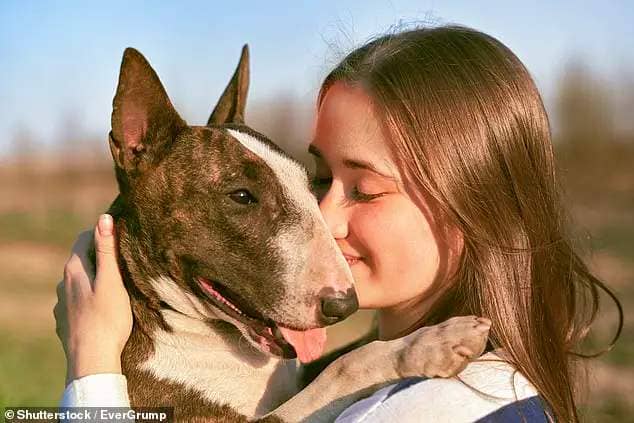With their adorable faces and wagging tails, it’s no surprise that dogs have been man’s best friends for thousands of years.
But not all breeds are equal when it comes to training – and if your pooch isn’t well-behaved, it can become a massive source of stress.
In a new study, researchers from the University of Helsinki have revealed the easiest breeds to train.
Their findings suggest that Australian Cobberdogs, Australian Labradoodles, and Golden Labrador Retrievers have the best focus when it comes to training.
In contrast, Bull type terriers, Sled dogs, and Parson type terriers are the trickiest to train, according to the study.

In a new study, researchers from the University of Helsinki have revealed the easiest breeds to train. Pictured: an Australian Cobberdog

Bull type terriers (pictured), Sled dogs and Parson type terriers are the trickiest to train, according to the study
In the study, the team set out to investigate the personality differences between dog breeds.
‘The breed of the dog is the most important determinant underlying personality differences,’ said Dr Milla Salonen, lead author of the study.
‘All dogs are individuals, and all breeds have different traits, but the breeds differ in what kind of personality most dogs within each breed have.’
The team collected an enormous behavioural survey dataset containing information on 11,000 dogs across 300 different breeds.
These were then categorised into 52 groups.
The data revealed a strong link between breed and seven personality traits.
These were insecurity, training focus, aggressiveness/dominance, energy, dog sociability, human sociability, and perseverance.’
In terms of training, the ‘other breeds’ group topped the list as the easiest to train.

Parson type terriers were found to be some of the trickiest breeds to train. Pictured: a Parson Russell Terrier
This group included Australian Cobberdog, Australian Labradoodle, Golden Labrador Retriever, Indian Pariah Dog, Peruvian Hairless Dog Large, Peruvian Hairless Dog Medium sized, Peruvian Hairless Dog Miniature, Seskar seal dog, Unknown breed, Wolfdog, Xoloitzcuintle Intermediate and Xoloitzcuintle Standard.
This group was closely followed by Labrador Retriever, Border Collie and Spanish Water Dog.
At the other end of the scale, Bull type terriers, Sled dogs, Parson type terriers and Pinschers/Schnauzers were deemed the most difficult to train.
Aside from breed, several other factors were found to influence a dog’s trainability.
Female dogs were found to be easier to train, while training also became easier as dogs got older.
Meanwhile, neutered dogs were found to be trickier to train than those who had not yet been sterilised.
‘Based on our research, personality traits are extremely complex and have astounding similarities between dogs, humans and other animals,’ Dr Salonen added.


